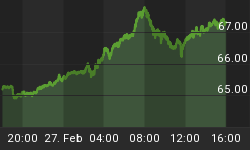Dow Jones Industrial Average 9962
Value Line Arithmetic Index 1511
30-Year Treasury Index 5.17%
The Big Picture for Stocks
The 2002-2004 bull market appears to be over.
Technical Trendicator Direction:
Stock Prices Down
Bond Prices Up
This is tough letter to write. We are not perennial bears. But we have been warning of a possible top in this bull market for months. It now looks like we are indeed in the next bear market. If the 4-year cycle holds up, we would expect the next market bottom in 2006. Previous bottoms were in 1962, 1966, 1970, 1974, 1978, 1982, 1984, 1987 (a year late), 1990, 1994, 1998, and 2002.
The economic cycle, always enough of a challenge for the investor, is now complicated by the war. There have been repeated warnings lately that Al Queda may try something soon, perhaps to disrupt the elections in November. It has been said by some that they actually have multiple nuclear weapons - and that they have them inside of the United States. Supposedly, these are not just the so-called dirty bombs, but actual nuclear explosives - perhaps obtained from dissident Russian scientists or built with the help of a Pakistani nuclear scientist.
What little I can find on the internet about the probabilities of such an attack suggests that the chances are low. Apparently a nuclear bomb needs a detonating device that has a very short shelf life. Any bomb that the terrorists may have would probably be "expired."
However, we cannot ignore this threat, even if the chances are very low. Just the threat itself is a psychological problem for the markets.
If the terrorists were successful in an attempt to destroy several large American cities at the same time, are there any precautions that could at least help one survive - assuming that one was not in one of those targeted cities? Perhaps not. But perhaps it would not be a bad idea to have several months supply of cash. I do not mean cash in the bank. Don't kid yourself; the banking system could shut down.
If one really wanted to have a dire emergency fund, my only thoughts are to have on hand an equal amount of U.S. dollars, gold, and Swiss francs. (Boy, I am so embarrassed to write this as it sounds like the perennially bearish kooks I have read about over the years.) But let's walk through this. If we get hit, dollars may not be worth much. Foreign currencies might have more value. I even wonder if currencies of a relatively isolated country (China?) might be better than dollars. Historically, Swiss francs have been the go-to currency because of the gold reserves held by the country and because of its political neutrality.
Unfortunately, there are other possible scenarios that could precipitate a depression. We have so much debt in the economy that a mild recession could turn into a depression. Interest rates are so low now, the Fed could be of no help trying to goose the economy with lower interest rates. Since our banking system is in reality an mountain of debt, if the debt level contracts, the house of cards could collapse. If the building boom and other consumer buying dries up, the problems could be severe without some other stimulus. In the last 70 years, we have always been able to muddle through somehow, but there is no law of physics or economics that precludes a very large economic decline - call it what you like.
Well, we could elaborate. But the point has been made.
Now, I could stand up, walk around my chair, sit down and paint an entirely different and rosy picture. The bullish case is primarily the growth opportunities developing from third world countries. The whole world could benefit from the growth of China and India. One could see a marvelous worldwide boom that lasts for years.
Indeed, as I watch the China stock market, it looks like these stocks are near bottoms. I also suspect that many microcap stocks that have been beaten up so badly may be about ready to turn up. But I also see major tops on the long term charts of hundreds of mid-cap and large-cap stocks which are rolling over to the downside.
Bottom line - take precautions.
Regards,















